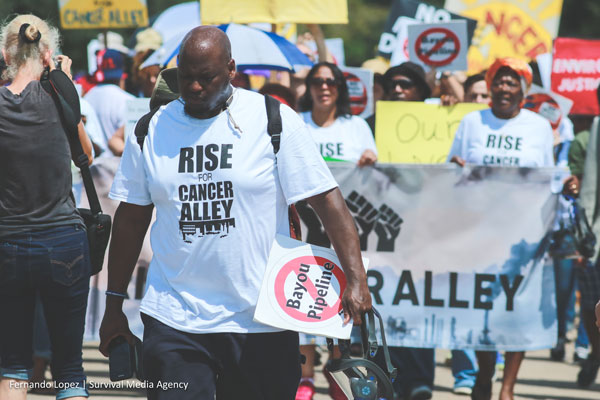The window to stay below 1.5°C of warming is closing fast. People’s lives are at stake – we must get to zero fossil fuels as fast as possible. This story is from thePeople’s Dossier with stories on 1.5°C here.
In the bayous of Louisiana, long term residents, committed activist, and community leaders are rising up against Bayou Bridge, a proposed 162 miles long pipeline owned by Energy Transfer Partners which is threatening their water and their way of life. The very construction of the pipeline is damaging Louisiana’s wetlands: BBP will destroy 150 acres of wetlands in its path and will impact 450 more acres. Louisiana’s wetlands are already being impacted by climate change and development, with the state losing an average of one acre of coastal wetlands per hour to rising sea levels. Existing oil pipelines have already damaged industries in the area, and BBP only makes these problems worse, increases flooding, and irreparably damages the ecosystem.
The water protectors of Louisiana are risking arrest to protect their communities from the many detrimental effects of a pipeline running through their area- not only does it threaten their water and way of life; these types of fossil fuel projects and fossil fuel extraction contribute to our planet’s warming at dangerous levels. The oil running through the Bayou Bridge Pipeline emits a carbon equivalent of 30 new coal plants. The pipeline is not compatible with a global mandate to limit warming to below 1.5°C.

Fernando Lopez | Survival Media Agency
The oil that would move through the BBP would come directly from North Dakota by way of the Dakota Access pipeline, only to be exported overseas. Inspired by Dakota Access Camp, Bayou Bridge Resistance created the L’eau est la Vie Camp. The fight has been intensifying, with police tasering and arresting water protectors who are actively putting their bodies on the line to stop the pipeline.
Louisiana is one of the hardest hit regions of the United States when it comes to climate impacts such as intense hurricanes, which have devastated in particular low-income communities, people of color, and other vulnerable populations who face the highest risk and have the hardest recovery. In addition, toxic waste dumps, sewage treatments, and other deadly pollution sources have greatly impacted poor communities in the region, and are rarely if ever found near middle class, white, affluent suburbs. The people of St. James, Louisiana, who are fighting against the Bayou Bridge Pipeline are already surrounded by multi-billion dollar methanol plants. St James has earned the name of Cancer Alley.
The inspiring resistance of the water protectors and allies in Louisiana is a demonstration of a fight for livelihoods in the face of corporate greed and intensifying climate impacts.
You can stand in solidarity with communities confronting climate change around the world. Register a local delivery action to send the message: science says we must get off fossil fuels.